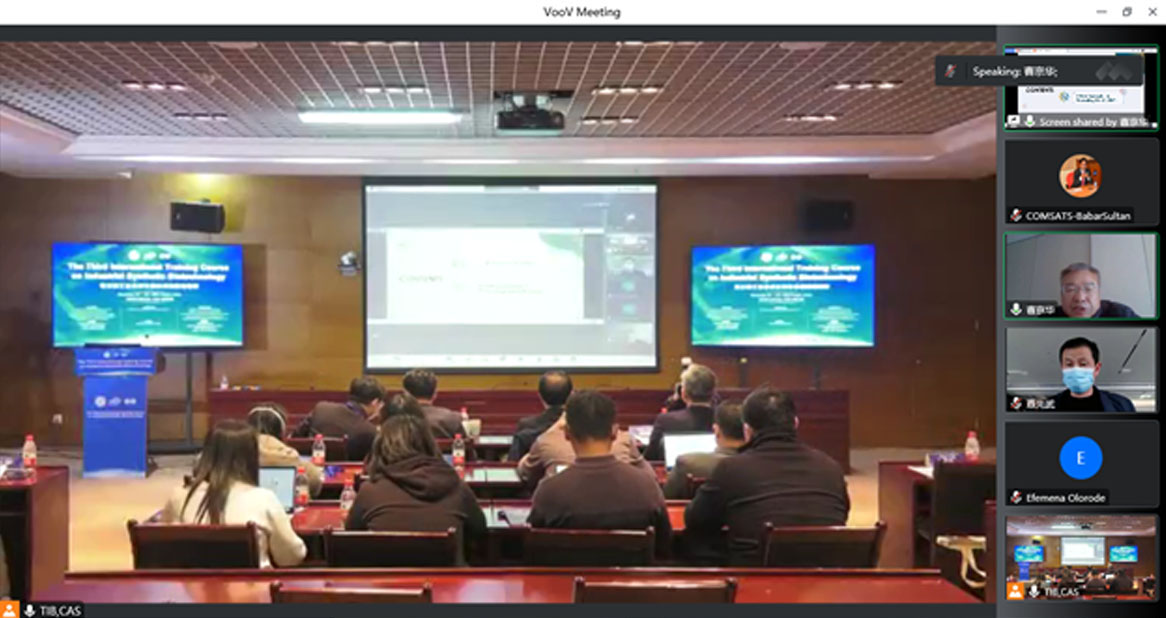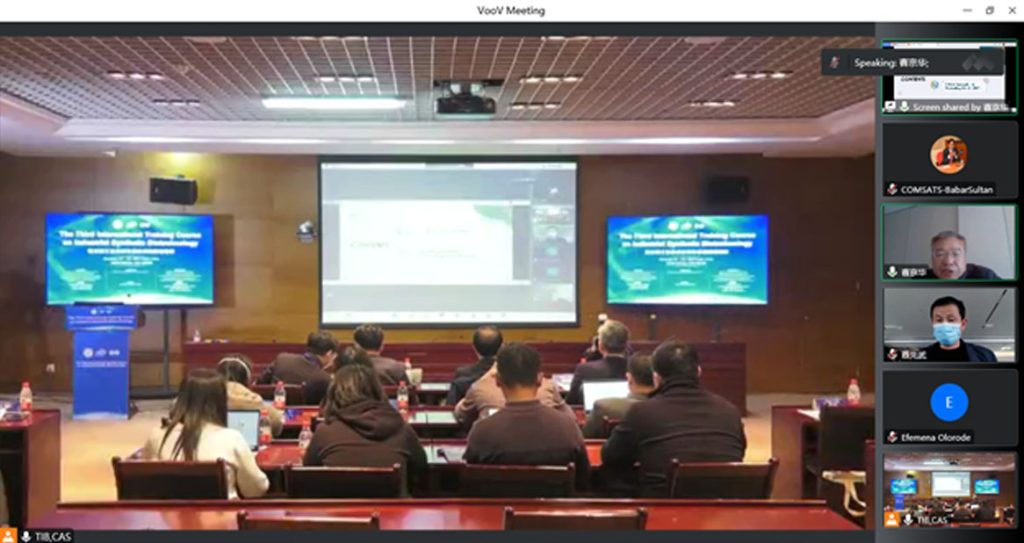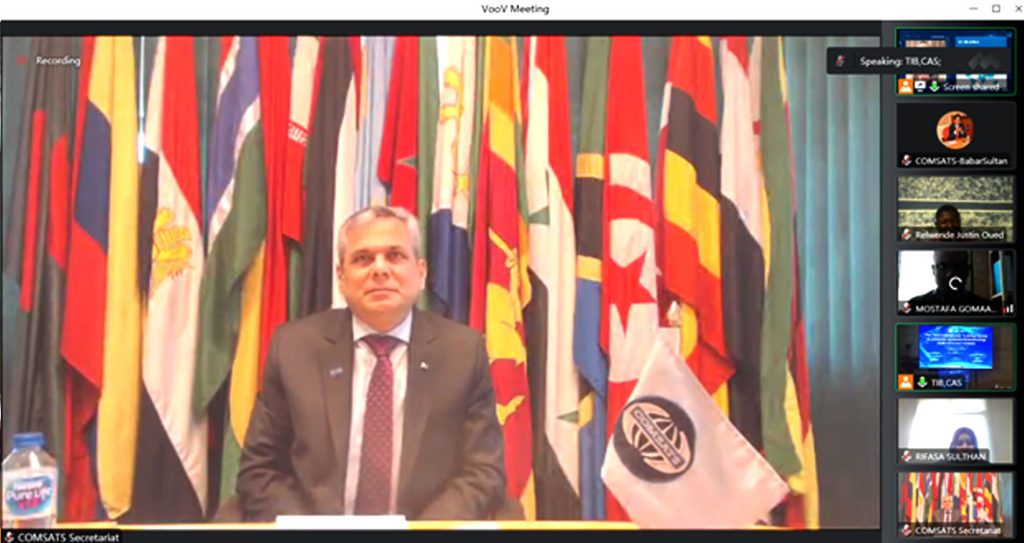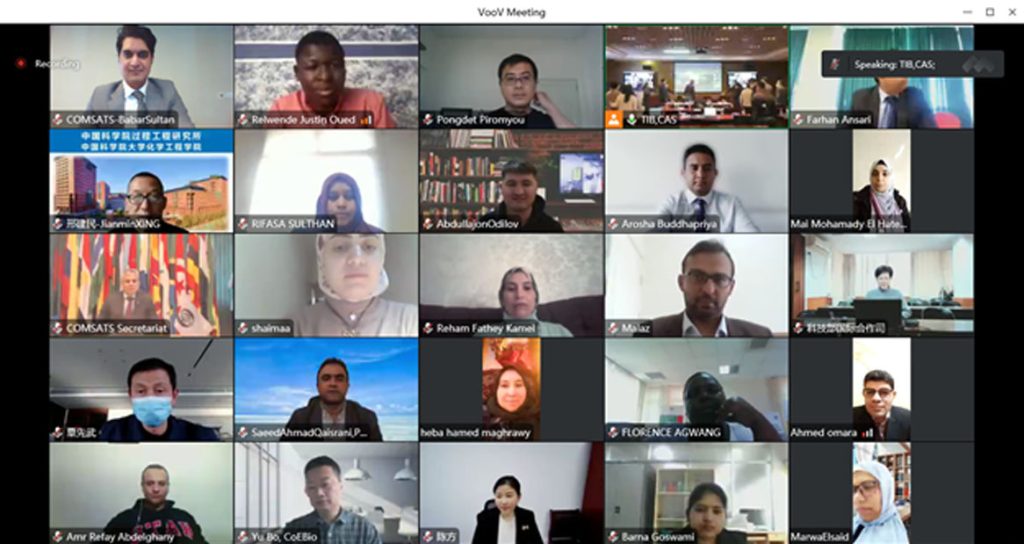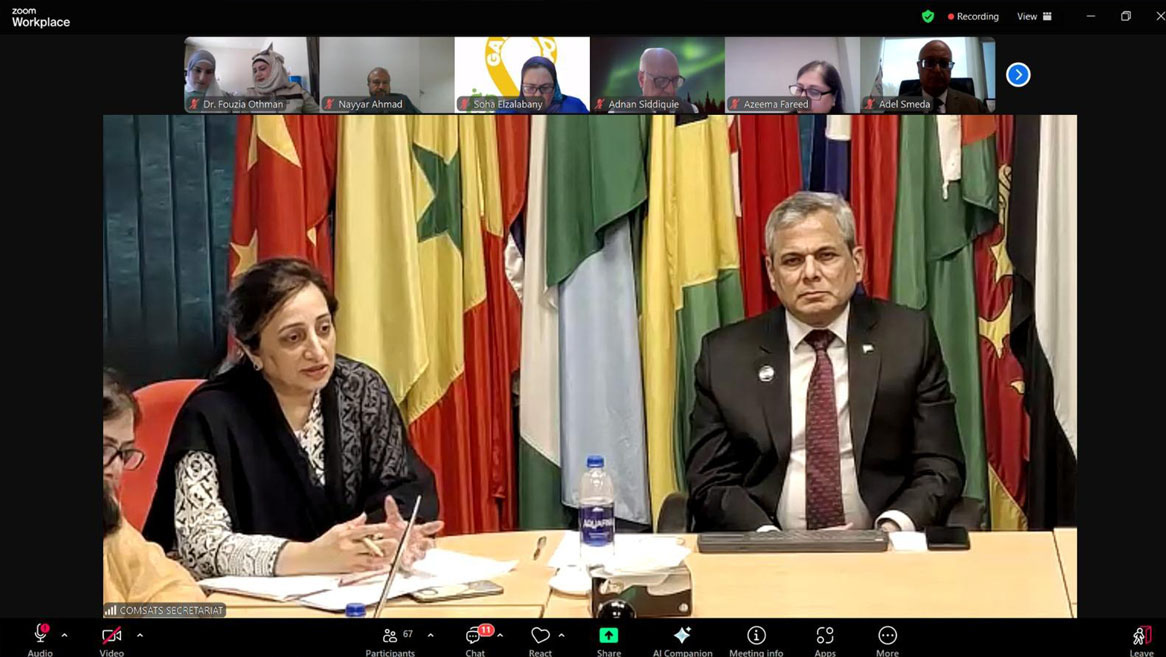The Third International Training Course on ‘Industrial Synthetic Biotechnology’ (online training), was jointly organized by the Tianjin Institute of Industrial Biotechnology (TIB), in collaboration with the Alliance of International Science Organizations (ANSO); and the Commission on Science and Technology for Sustainable Development in the South (COMSATS), from the platform of COMSATS Centre for Industrial Biotechnology (CCIB). The training course aims to enhance the capacity of researchers and scientists belonging to the Belt and Road countries and beyond, especially COMSATS’ member countries, in the field of industrial synthetic biotechnology, through theory, practice, and application.
The training was inaugurated on 12th December 2022, in Tianjin, China, and was attended by the large number of scientists and officials, including members of CCIB’s Consultative Committee and Technical Advisory Committee, distinguished scientists of TIB, officials of COMSATS Secretariat, senior government officials from Ministry of Science and Technology (MoST), China and the local government of Tianjin. Fifty-two researchers and scientists belonging to developing countries, including Bangladesh, Burkina Faso, China, Egypt, Indonesia, Nepal, Nigeria, Pakistan, Sri Lanka, Syria, Thailand and Uganda, taking part in the course as trainees, also attended the opening ceremony online.
Deputy Director-General TIB and Director CCIB, Prof. Jubin Sun, gave the inaugural address. He welcomed the distinguished subject experts and participants and highlighted the disruptive impact of Industrial Synthetic Biotechnology for socio-economic sustainable development. He opined that the industrial application of synthetic biology is expected to provide new solutions to the major challenges related to conservation of resources, health and environment being faced by people around the world. He reiterated TIB’s commitment to promoting eco-friendly development in industrial sector through innovation-driven synthetic biology and green bio-manufacturing. He thanked COMSATS and ANSO for their collaboration for holding this training.
In his opening speech, Director-General TIB, Prof. Yanhe Ma, extended a warm welcome to all the participants. He thanked and appreciated the support of COMSATS and other partners. He stated that this training will be instrumental for researchers and scientists to thrive in the field of synthetic biotechnology for the prosperity and development of their communities as well as global sustainable development.
In his address, Prof. Jinghua Cao, Executive Director ANSO, stated that ANSO is significantly facilitating scientific and technological innovation in ‘Belt and Road’, region through initiating and supporting a number of capacity building activities and programmes. He believed that trainees will broaden their skill sets related to innovation and creativity in the field of biotechnology through various modules being covered by this training, which in-turn will prove to be instrumental in the ‘Belt and Road’ region’s growth.
Speaking on the occasion, Ambassador Dr. Mohammad Nafees Zakaria, Executive Director COMSATS, paid gratitude to TIB and other collaborative organizations join hands with COMSATS to hold this valuable training course benefiting developing countries, particularly the COMSATS’ member countries. Dr. Zakaria emphasized the significance of industrial synthetic biotechnology and its application in high tech, energy, medical, agriculture, and food sectors. He particularly stressed upon exploration of natural ways to supplement conventional agricultural practices in order to meet the increasing demand for a steady and healthy food supply. Dr. Zakaria hoped that participants would gain strong theoretical knowledge and practical skills as well as evidence-based knowledge in the field of industrial biotechnology, which would enable them to promote innovations in the field and use them to accomplish shared social and economic objectives.
In her remarks at the occasion, Ms. Xuemei Yang, Division Director, Department of International Cooperation, China’s Ministry of Science and Technology, stated that creation of new knowledge in this important field and its widespread application has the potential to significantly enhance local and regional sustainability. She welcomed the initiative of holding the training and believed that events like this may help mentor young scientists who, with their creative ideas, can make remarkable contributions in the field of biotechnology.
Subsequently, Prof. Sun Jibin made a keynote presentation, in which he provided an overview of industrial applications of synthetic biology and connected it to the solutions to the most critical issues currently faced by the world facing resource conservation, human health, and environmental preservation today. He particularly shed light on various methodologies and enabling technologies, as well as some major achievements in the field of industrial technology. Prof. Sun also covered a virtual excursion to TIB with the view to showcase its state-of-the-art laboratory facilities and diverse array of cutting-edge instruments.
The training program primarily comprised six technical sessions having keynote lectures and talks by subject experts; as well as six experimental sessions, and three sessions of industrial courses.
Some of the main topics covered under six themes were: 1) Frontier Technology on Biomedicine: Biosynthesis of Plant derived natural products, Engineering the Plant Cell Factory for the Production of Plant Natural Products, Biocatalysis Enables Efficient Organic Transformations and Industrial Processes; 2) Frontier Technology on Bio-agriculture: biomass degradation and bio-based chemical production, Microbiome Data Analysis and Synthetic Community Experiment Revealing Causality, Research in Strigolactone Biosynthesis and Signaling Pathway and its Application in Agriculture; 3) Frontier Technology on Future Food: Cultured Meat in China, Food Fermentation by Cell-free Multi-enzymes, Enzymatic Platform for Biomanufacturing of New Functional Foods; 4) Frontier Technology on Bio-chemicals: Biocatalytic Synthesis of Chiral Molecules and Industrial Applications, Biomanufacturing and Intelligent Control Systems, Synergies Between Synthetic Biology and Metabolic Engineering for Improved; 5) Frontier Technology on Bio-based Materials: Synthetic Biology of Materials, Synthesis of Biodegradable Plastic Polylactic Acid in the era of SynBiotech, Bio-based Production of Material Monomers; 6) Frontier Technology on Bioenergy: Progress of Anaerobic Digestion Technology for Biogas Production, Construction of Bioelectrochemical Systems for Bioelectricity Conversion, Application of Synthetic Microbial Consortia in Bio-refinery System.
During the experimental courses sessions, experiments of enabling technologies demonstrated, including: 1) High-throughput and Automated Genome Engineering; 2) Technology of Systems Biology in Metabolic Engineering; 3) X-ray Protein Crystal Structure Determination; 4) Introduction to DNA Synthesis; 5) Design of Metabolic Pathways Based on the Genome-Scale Metabolic Network; and 6) Intelligent Fermentation Technology
During the concluding session, Director-General TIB, Prof. Jibin Sun, delivered a brief presentation on COMSATS Joint Centre for Industrial Biotechnology (CCIB), covering its objectives, tasks, areas of joint research, major initiatives, trainings and exchange. He informed that CCIB was established under the framework of the National Center of Technology Innovation for Synthetic Biology (NC SynBio) of China, with a view to promoting meaningful cooperation among the developing countries, particularly COMSATS’ Member Countries, in the field of industrial biotechnology. Highlighting the progress and ongoing research activities of the Centre, he informed that so far five high-level joint R&D projects involving research teams from the Member States have been initiated; 14 young visiting scholars were supported; four Science Citation Index (SCI) papers have been published; and two patents applied.
During the discussion session, the trainees reviewed major industrial synthetic biotechnology research initiatives and explored avenues of networking and collaboration prospects in order to create potential partnerships and create novel synergies. The discussion was followed by a graduation ceremony, during which participants shared the information regarding their different skillsets, vast research experience and diverse academic backgrounds and agreed to collaborate for interdisciplinary research projects of CCIB’s R&D Groups on bio-medicine, bio-agriculture, future food, bio-energy, bio-chemical, and bio-based materials.

